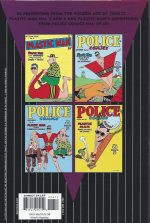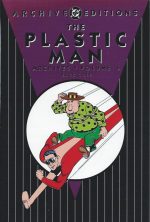

By Jack Cole & various (DC Comics)
ISBN: 978-1-4012-0154-8
Jack Cole was one of the most uniquely gifted talents of American comics’ Golden Age. Before moving into mature magazine and gag markets he originated landmark tales in horror, true crime, war, adventure and especially superhero comicbooks, and his incredible humour-hero Plastic Man remains an unsurpassed benchmark of screwball costumed hi-jinks: frequently copied but never equalled. It was a glittering career of distinction which Cole was clearly embarrassed by and unhappy with.
In 1954 Cole quit comics for the lucrative and prestigious field of magazine cartooning, swiftly becoming a household name when his brilliant watercolour gags and stunningly saucy pictures began regularly running in Playboy from the fifth issue.
Cole eventually moved into the lofty realms of newspaper strips and, in May 1958, achieved his life-long ambition by launching a syndicated newspaper strip, the domestic comedy Betsy and Me.
On August 13th 1958, at the peak of his greatest success, he took his own life. The reasons remain unknown.
Without doubt – and despite his other triumphal comicbook innovations such as Silver Streak, Daredevil, The Claw, Death Patrol, Midnight, Quicksilver, The Barker, The Comet and a uniquely twisted and phenomenally popular take on the crime and horror genres – Cole’s greatest creation and contribution was the zany Malleable Marvel who quickly grew from a minor back-up character into one of the most memorable and popular heroes of the era.
“Plas†was the wondrously perfect fantastic embodiment of the sheer energy, verve and creativity of an era when anything went and comics-makers were prepared to try out every outlandish idea…
Eel O’Brian was a brilliant career criminal wounded during a factory robbery, soaked by a vat of spilled acid and callously abandoned by his thieving buddies. Left for dead, he was saved by a monk who nursed him back to health and proved to the hardened thug that the world was not just filled with brutes and vicious chisellers after a fast buck.
His entire outlook altered and now blessed with incredible elasticity, Eel resolved to put his new powers to good use: cleaning up the scum he used to run with.
Creating a costumed alter ego, he began a stormy association with the New York City cops before being recruited as a most special agent of the FBI…
He soon reluctantly adopted the most unforgettable comedy sidekick in comics history. Woozy Winks was a dopey, indolent slob and utterly amoral pickpocket who accidentally saved a wizard’s life and was blessed in return with a gift of invulnerability: all the forces of nature would henceforth protect him from injury or death – if said forces felt like it.
After failing to halt the unlikely superman’s determined crime spree, Plas appealed to the scoundrel’s sentimentality and, once Woozy tearfully repented, was compelled to keep him around in case he strayed again. The oaf was slavishly loyal but perpetually back-sliding into pernicious old habits…
Equal parts Artful Dodger and Mr Micawber, with the verbal skills and intellect of Lou Costello’s screen persona or the over-filled potato sack he resembled, Winks was the perfect foil for Plastic Man: a lazy, greedy, morally bankrupt reprobate with perennially sticky fingers who got all the best lines, possessed an inexplicable charm and had a habit of finding trouble. It was the ideal marriage of inconvenience…
This sublimely sturdy sixth full-colour hardback exposes more eccentrically exaggerated exploits of the elastic eidolon from Plastic Man #5 and 6 and his regular monthly beat in Police Comics #59-65, covering October 1946 to April 1947. Before the hilarious action kicks off, Michael T. Gilbert offers an appreciation of Cole and his gift for concocting uniquely memorable characters in the Foreword after which the power-packed contents of his fifth solo-starring vehicle commences with ‘They Call Him Weapons’ as a seemingly innocuous gunsmith graduates from selling his ordnance innovations to criminals to becoming a bandit himself. His bloody trail leads Plas and Woozy to a house the tinkerer has tricked up into an inescapable death trap…
Cole’s constant and ever-growing pressure to fill pages led to his hiring artists to assist in the illustration of his madcap scripts. Alex Kotzky pitched in for ‘The Mysterious Being Called Hate’ as our chameleonic crime-crusher faces sorcerous neophyte Mr. Giglamp after the infernally inquisitive fool finds himself a satanic sponsor and becomes a demonic danger to society.
Woozy had his own back-up solo feature in Plastic Man and here the Stalwart Simpleton inspires a down-at-heel gangster to modify a heroic legend to his own unscrupulous ends in ‘Robin Hood Returns’ (drawn by Bart Toomey), after which prose puzzler ‘Snig River’ sees a simple fishing trip prank land a basket full of fugitive crooks. A baffling mystery then confounds the populace in ‘The Evil of Moneybags’. When millionaire Aloysius P. Japers starts giving away all his money only the stretchable sleuth notices that all the beneficiaries start turning up dead and penniless…
In Police Comics #59 Woozy and Plas are helpless before ‘The Menace of Mr. Happiness’ (Cole & Andre LeBlanc) as a drug store clerk accidentally invents a serum which paralyses victims with joy whilst #60 invoked the author’s fascination with mad scientists in ‘The Man Who Built Himself a Body’ (Cole & LeBlanc) as weedy Professor Spindrift constructs a series of robot suits so that he can muscle his way to the top of the underworld…
A million-dollar bounty on Plastic Man leads to ‘A Bundle of Trouble’ (Cole & LeBlanc) in Police #61, culminating in a baby-sized assassin infiltrating the hero’s home as a heavily armed foundling, before Plastic Man #6 opens with criminal genius Scientific Sherman stealing the astronomical discoveries of ‘The Moon Wizard’ and seemingly stranding Plas and Woozy on the distant lunar orb.
‘The Crimes of Mother Goose’ features a crook committing fairy tale-inspired thefts to bewilder the Ductile Detective and his partner after which Woozy hunts alone for ‘The Zwili Cat’ (Cole & Kotzky) obsessing crooks and bad-men all over town, before text tale ‘Scarlett Goes Straight’ finds our hero helping an ex-con capture his former unrepentant associates.
To close the issue, a common jewel thief gains incredible leaping powers and becomes costumed crook ‘The Grasshopper’ (Cole & Kotzky) but is ultimately unable to escape the relentless and remarkable reach of his pliable pursuer.
Police Comics #62 finds flashy socialite Leda Van Doom interviewing prospective husbands only to lose one in suspicious circumstances in ‘The Cupid’s Bow Murder’.
After solving that thorny mystery Plas and Woozy combat a macabre gambling boss moonlighting as a marine marauder dubbed ‘The Crab’ in #63 and paint a ‘Bulls-Eye on Crime’ a month later as they expose a candy factory operating as a clearing house for stolen gems before wrapping up this compendium of comedic crime-busting by helping homeless newlyweds find a place to live.
Sadly, that task entails evicting and arresting a house full of deadly spies and clearing all the death traps out of ‘The Apartment of Dr. Phobia’…
Augmented by all the astoundingly ingenious covers, this is another unmissable masterclass of funnybook virtuosity: still exciting, breathtakingly original, thrilling, witty, scary, visually outrageous and pictorially intoxicating more than seventy years after Jack Cole first put pen to paper.
Plastic Man is a unique creation and this is a magical experience comics fans would be crazy to avoid.
© 1946, 1947, 2004 DC Comics. All Rights Reserved.
